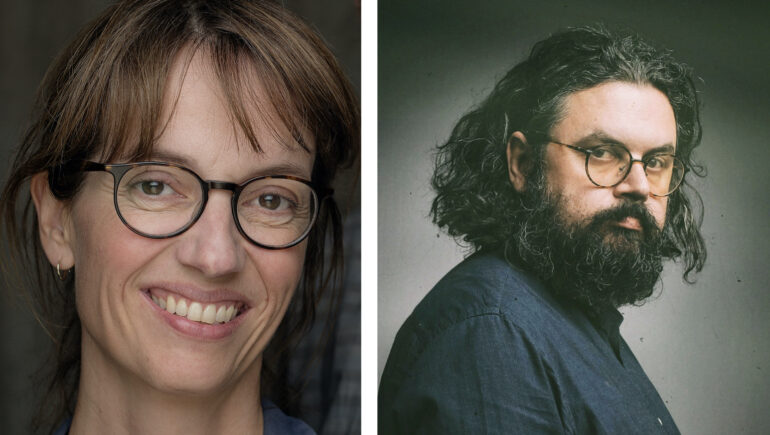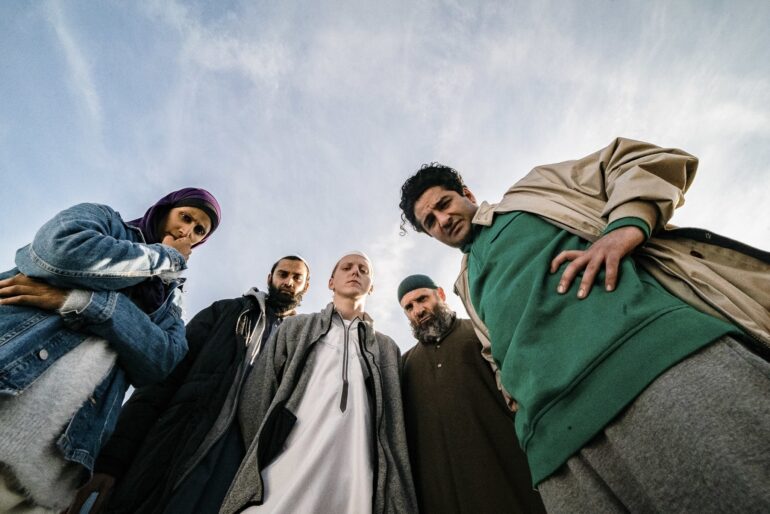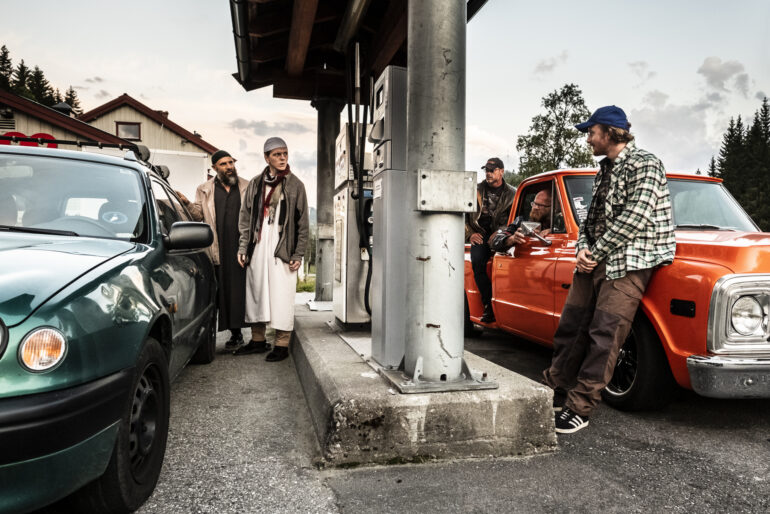Written by: Annika Pham
17.01.22
Countrymen co-writers Anne Björnstad and Izer Aliu discuss the Norwegian comedy drama produced by Rubicon TV for NRK.
The 8X45’ satirical drama Countrymen
(Jordbrukerne) is among five series competing for the 6th Nordisk Film & TV Fond Prize for outstanding screenwriting of a Nordic drama series, to be handed out February 2, 2022 during Göteborg’s TV Drama Vision.
Writer/director executive produce Anne Bjørnstad is associated to some of Norway’s biggest international TV hits: NRK/Netflix’s Lilyhammer and HBO Max’s Beforeigners. She acts as Head of Drama at Norway’s production house Rubicon TV, part of Banijay Group.
Macedonia-born Oslo-based writer/director Izer Aliu had his breakthrough with the short film To Guard A Mountain, nominated for a Student Oscar in 2013. His feature debut Hunting Flies was nominated for the 2017 Nordic Council Film Prize. Countrymen
is his first foray into long-form storytelling.
The series follows four men from inner city Oslo, who move to picturesque Telemark with suspicious plans, but end up setting up Norway’s first halal cheese making business. It’s a story about community and belonging, finding meaning in life where you least expect it. The main narrative centres around whether the guys will go through with their original plans or not.
In the title roles are Nader Khademi (Ninjababy, Beforeigners), Ayaz Hussain (Kasim Bæder), Jonas Strand Gravli (Ragnarok, July 22) Arben Bala (Exit, Lilyhammer) and Erika Strand Mamelund. Izer Aliu is concept director, with Aurora Gossé and Brwa Vahabpour serving as episodic directors.
The show won the Ensemble Cast and High School Prize-Best Series at the last Canneseries.
Countrymen was co-produced by Arte France, with support from the Norwegian Film Institute and Nordisk Film & TV Fond. Banijay Rights handles global distribution.
The series premiered on NRK last October.
What does it mean for you to be nominated for Best Nordic Screenplay with Countrymen?
Anne Bjørnstad: With so many good series coming out of the Nordics, it’s an honour to be nominated. Very happy that a quirky series like ours receives this kind of recognition.
Izer Aliu: I am happy for the nomination, especially with Anne because we've had some great discussions and played around with the narrative form, especially with stereotypes and generalisations.
What type of stories are you drawn to?
AB: I’m omnivorous and will be drawn to any kind of story that is at some level surprising and tells me something I didn’t know I wanted to find out. I prefer stories that make me both laugh and cry.
IA: I don't think I have one certain story to tell. I might have. But I am not aware of it. I think there is always something that needs to be told, but not everything needs to be heard. I think the stories we are told as children are there to feel, to make us think, to make us strong, to allow us to feel weak. The stories we tell ourselves might be more complex, but they are at its core the same.
When did you get into screenwriting? Was storytelling and writing always a passion?
AB: I started out as a comedy writer for topical satire shows. While we worked on one of those shows, Eilif Skodvin [Rubicon development manager, writer,] and I came up with the idea for our first series Lilyhammer, and since then I have been lucky enough to co-create and co-write a number of drama series, like Countrymen and Beforeigners for HBO Max. My childhood dream was to be an author, and this is close enough.
IA: My earliest memories of writing stories were remembering the reaction of my parents. At school, we had to write something, I think it was around 2nd grade. I had written about the life of a coin and the people's hands it passed through. I got praised by the teacher and my parents were very proud. The next story I wrote was about a boy and the fear he felt when his parents were arguing in the other room. The reaction of my parents was different this time. Not so proud. It turns out, some stories are private. Some stories are not to be told, which was weird, because that made me find it comical. When you start observing and detach yourself, the patterns of arguing parents becomes very funny. They always do the same things, say the same things, bluff a lot. Threatening to leave, then not leaving. I didn't think this then, but I see now how moments like this are like therapy. Turning fear into fun and then sharing the fun of the pain with others.
Where did the idea for Countrymen come from?
AB: Countrymen started out with the idea for an interesting story engine, and Izer and actor Nader Khademi came on board in the early days of development. The thought that a group of urban men with sinister plans could come to think it was a good idea to move to a farm, had both a credibility and a silliness to it that seemed appealing. It would allow us to bring very different characters together and explore the relationships between them.
What were the biggest challenges during the writing process? How to tackle religious radicalization with humour?
AB: The hardest part was to get the tone and the balance of the story right. Izer’s idea of playing on different kinds of stereotypes and turning them inside out, was key.
IA: Together with Anne and our commissioners, we had a lot of discussions. Religious rituals can be a bit absurd and perceived as weird by non-believers. We played with this and made sure we would always deal with religion with respect. In reality, people with immigrant backgrounds tend to see their adopted country differently than true natives. Each individual is unique and sees things through his/her own prism, tainted by their own cultural baggage. We did focus groups on the series and saw that different people laughed at different things.
With my own foreign origin [Albanian/Norwegian, born in Macedonia], I have a different viewpoint on Norwegian society. I have also become more aware of my own background as a Muslim through people’s perception. You’re often faced with people’s prejudice, about one’s different ethnicity or religion, but that can also open doors to satire. With Anne, we tried to depict a reality that can be talked about. Our goal was not to step on people’s toes.
You've become a bit of a specialist of cultural clashes/fish out-of-water storytelling. Is humour simply the best way to fight bigotry and prejudice for you?
AB: I find the theme/ phenomenon co-existence interesting in a number of ways, and the fact that it lends itself both to drama, tragedy and comedy makes it an appealing drama ingredient. My main motivation as a scriptwriter is not didactic. I’m trying to tell engaging stories that explore interesting themes and motives, and leave it up to the viewers what to think of it.
What do you hope viewers will take away from the show?
AB: A curiosity about other people, a feeling that people aren’t just what you see at first glance.
What's next for you?
AB: I’m in development with a couple of projects for NRK and HBO Max. And I hope to be able to collaborate with Izer in the future.
IA: I've received funding from the Norwegian Film Institute to develop a feature and a series. Then my film 12 Dare is world premiering in Göteborg.
Could you cite your 3 top TV dramas (Nordic or non-Nordic) that you've watched recently?
AB: Succession, Ethos, State of Happiness.
IA: I can't even remember, we watch so much in our family and because of the kids, we end up watching a lot of Korean series and anime. We are hoping to see the end of One Piece which is up its thousand episode! Beforeigners of course is great, and I’m looking forward to watching the Danish drama Fredløs [DR3] which seems really awesome.
FOR MORE INFORMATION ABOUT THE NORDIC FILM & TV FOND PRIZE 2022: CLICK HERE.


